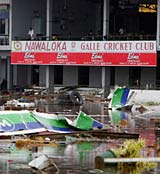The tsunami-wrecked Galle International Stadium will definitely be reconstructed. However, while the ground's international future is looking much brighter, it has not yet been confirmed because of unfinalised plans to build a new stadium a few miles further down Sri Lanka's south coast.
"Sri Lanka Cricket have given us their assurances and we are definitely going to be rebuilding the stadium now," Jayanda Warnaweera, the venue's charismatic curator, told Cricinfo. "We are now just waiting for the government green light as redevelopment plans for the Galle city as a whole have not yet been finalised."
So far only the main debris from the tsumani, which included smashed-up vehicles and fishing boats, has been cleared. "We hope that work can start properly in about six months," said Warnaweera. "There are still a lot of unsettled people living here in roadside tents and schools and it would not be fair by them to start reconstruction now."
Galle's future as a cricket venue was thrown into doubt after the devastating Boxing Day tsunami, which circled around the 400-year-old Dutch fort and then flooded the stadium from both sides. Among the ruins were the main spectator stand, outdoor practice nets, indoor training centre, perimeter fencing and the playing square and outfield, which is now saline and needs to be re-laid.
Cricket officials refused to commit to Galle's reconstruction in the immediate aftermath, claming to be concerned about safety issues for players and spectators, and arguing that it would be irresponsible to invest substantial funds into a venue that faced a miniscule but real chance of being hit by another tsunami. Instead, the board started investigating the possibility of developing a completely new stadium at Habaraduwaa.
However, the potential loss of one of the world's most picturesque sporting venues stirred up considerable debate and the safety arguments, especially in light of better early-warning tsunami systems being implemented, lost some of their strength. Financially, too, it became clear that the cost of restoring the ground would not be prohibitive, starting from £500,000 for a basic reconstruction.
The plans for the Habaraduwaa Stadium, which would have the advantage of being fully-owned by Sri Lanka and free from the archeological development restrictions in Galle, have not been shelved but the current cricket administration crisis means they are effectively on hold. If Habaraduwaa did go ahead then Galle would probably be used only for first-class and provincial cricket.

